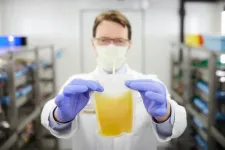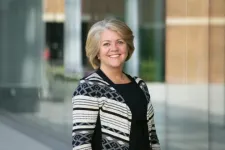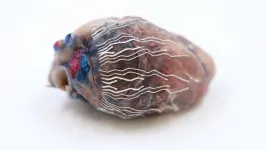Hackensack Meridian CDI scientists develop 'CATCHER' for crucial biomarkers
The EV-CATCHER methodology identifies and captures tiny pieces of genetic material -- and shows value in COVID-19 plasma
2021-06-17
(Press-News.org) June 17, 2021 - Nutley, NJ - Tiny genetic markers, circulating in the blood, have shown great promise in diagnosing and treating disease. Yet identifying and harvesting these extracellular vesicles (EVs) have been a major challenge for science.
Now a laboratory at the Hackensack Meridian Center for Discovery and Innovation (CDI) has discovered a highly sensitive methodology that can efficiently find and harness EVs - particularly exosomes and the micro RNAs they carry. These could be crucial clues to identifying diseases such as cancer early on in its development.
The scientists have now unveiled the Extracellular Vesicle Capture by AnTibody of CHoice and 1 Enzymatic Release, or EV-CATCHER, in the Journal of Extracellular Vesicles.
"We are establishing the threshold of detection," said Olivier Loudig, Ph.D., an associate member of the CDI. "The EV-CATCHER is really intended to push the envelope."
"This work shows us a new dimension to the study of circulating and exhaled biomarkers," said David Perlin, PhD., the chief scientific officer and senior vice president of the CDI. "The Loudig laboratory is elevating the field with this novel work which has great promise."
The EV-CATCHER was designed by Loudig as a high-throughput test to find and quantify tiny amounts of micro RNAs detected through next-generation sequencing. The technology uses targeted antibodies to bind to the molecules in plasma. It was developed after Loudig and his team tested 11 other methodologies, including magnetic beads, which were found to be inexact.
Testing the EV-CATCHER involved taking mouse-derived extracellular EVs that were spiked into human plasma. The results showed the EV-CATCHER caught the mouse-derived material - and the researchers were able to successfully extract the intact micro RNAs within.
Other analyses assessed samples from COVID-19 patients.
The first comparison used sequences from samples purified with the EV-CATCHER, in contrast to whole-serum samples. Loudig and his team were able to show which exosomes were hallmarks of hospitalized patients with serious disease, and which showed up in more moderate cases.
Separately, a test on convalescent plasma of recovered COVID-19 patients showed that high levels of anti-spike IgG antibodies demonstrated neutralizing properties against the SARS-CoV-2 virus, in vitro.
Furthermore, the testing showed that the COVID-19 patients' exosomes themselves had neutralizing properties on the virus - meaning it could have therapeutic value in convalescent plasma, and other potential treatments of the future.
"This paper demonstrates that the technology not only helps us detect and diagnose disease in its early stages - it can also potentially be used to help treat disease, as well," said Megan Mitchell, Ph.D., a postdoctoral research fellow in the Loudig lab, and a co-author of the paper.
INFORMATION:
ELSE PRESS RELEASES FROM THIS DATE:
2021-06-17
TAMPA, Fla. (June 17, 2021) - Tests that analyze biomarkers are used during cancer management to guide treatment and provide information about patient prognosis. These tests are often performed on tissue biopsy samples that require invasive procedures and can lead to significant side effects. In a new article published in the Journal for ImmunoTherapy of Cancer, Moffitt Cancer Center researchers show that PET/CT images can be used to measure levels of the PD-L1 biomarker of non-small cell lung cancer (NSCLC) patients in a non-invasive manner and, in turn, predict a patient's response to therapy. ...
2021-06-17
As pandemic restrictions begin to loosen around the country and summer temperatures rise, more people will be moving about on public rideshare electric scooters. With that comes this warning: Ride with safety.
A Henry Ford Health System study published in The Laryngoscope, shows that head and neck injuries caused by use of e-scooters have been on the rise since rideshare systems were introduced to the public in late 2017.
Kathleen Yaremchuk, M.D., Chair of the Department of Otolaryngology - Head and Neck Surgery and the study's senior author, said that a review of emergency visits in the last three years showed e-scooter injuries have increased significantly with many related to head and neck injuries. "Since e-scooters became a popular form of ...
2021-06-17
In the Name of Racial Justice: Why Bioethics Should Care about Environmental Toxins
Keisha Ray
Facilities that emit hazardous toxins, such as toxic landfills, oil refineries, and chemical plants, are disproportionately located in predominantly Black, Latinx, and Indigenous neighborhoods. Environmental injustices like these threaten just distribution of health itself. Facilities that emit environmental toxins wrongly make people's race, ethnicity, income, and neighborhood essential to who is allowed to breathe clean air and drink clean water, and thus, who is allowed to be healthy. This ...
2021-06-17
A large, retrospective, multicenter study involving Washington University School of Medicine in St. Louis indicates that convalescent plasma from recovered COVID-19 patients can dramatically improve likelihood of survival among blood cancer patients hospitalized with the virus.
The therapy involves transfusing plasma -- the pale yellow liquid in blood that is rich in antibodies -- from people who have recovered from COVID-19 into patients who have leukemia, lymphoma or other blood cancers and are hospitalized with the viral infection. The goal is to accelerate their disease-fighting response. Cancer patients may be at a higher risk of death related to COVID-19 because of their weakened immune systems.
The data, collected as part ...
2021-06-17
A new article, published as a Perspective in the journal Conservation Science and Practice, introduces a rapid assessment framework that can be used as a guide to make conservation and nature-based solutions more robust to future climate.
Climate change poses risks to conservation efforts, if practitioners assume a future climate similar to the past or present. For example, more frequent and intense disturbances, such as wildfire or drought-induced tree mortality, can threaten projects that are designed to enhance habitat for forest-dependent species and sequester carbon. Overlooking such climate-related risks can result in failed conservation investments and negative outcomes for people, biodiversity, and ecosystem integrity as well as lead to carbon-sink reversal. Drawing ...
2021-06-17
The Black Sea is an unusual body of water: below a depth of 150 metres the dissolved oxygen concentration sinks to around zero, meaning that higher life forms such as plants and animals cannot exist in these areas. At the same time, this semi-enclosed sea stores comparatively large amounts of organic carbon. A team of researchers led by Dr Gonzalo V. Gomez-Saez and Dr Jutta Niggemann from the University of Oldenburg's Institute for Chemistry and Biology of the Marine Environment (ICBM) has now presented a new hypothesis as to why organic compounds accumulate in the depths of the Black Sea - and other oxygen-depleted waters in the scientific journal Science Advances.
The researchers posit that reactions with hydrogen sulfide play an important role in stabilizing ...
2021-06-17
New Brunswick, N.J. (June 17, 2021) - Babies born by cesarean section don't have the same healthy bacteria as those born vaginally, but a Rutgers-led study for the first time finds that these natural bacteria can be restored.
The study appears in the journal Med.
The human microbiota consists of trillions of bacteria, viruses, fungi and other microorganisms - some beneficial, some harmful -- that live in and on our bodies. Women naturally provide these pioneer colonizers to their babies' sterile bodies during labor and birth, helping their immune system to develop. But antibiotics and C-sections disturb this passing of microbes and are related to increased risks of obesity, asthma and metabolic ...
2021-06-17
Woodlands along streams and rivers are an important part of California's diverse ecology. They are biodiversity hotspots, providing various ecosystem services including carbon sequestration and critical habitat for threatened and endangered species. But our land and water use have significantly impacted these ecosystems, sometimes in unexpected ways.
A team of researchers, including two at UC Santa Barbara, discovered that some riparian woodlands are benefitting from water that humans divert for our own needs. Although it seems like a boon to these ecosystems, the artificial ...
2021-06-17
SAN ANTONIO (June 17, 2021) -- Middle-aged people with depressive symptoms who carry a genetic variation called apolipoprotein (APOE) ε4 may be more at risk to develop tau protein accumulations in the brain's emotion- and memory-controlling regions, a new study by researchers from The University of Texas Health Science Center at San Antonio (UT Health San Antonio) and collaborating institutions suggests.
The Journal of Alzheimer's Disease published the findings in its June 2021 print issue. The research is based on depression assessments and positron emission tomography (PET) imaging conducted among 201 participants in the multigenerational Framingham Heart Study. The mean age of these participants was 53.
Decades before diagnosis
PET scans typically are conducted ...
2021-06-17
LOS ALAMOS, N.M., June 17, 2021 -- A research team from Los Alamos National Laboratory and Purdue University have developed bio-inks for biosensors that could help localize critical regions in tissues and organs during surgical operations.
"The ink used in the biosensors is biocompatible and provides a user-friendly design with excellent workable time frames of more than one day," said Kwan-Soo Lee, of Los Alamos' Chemical Diagnostics and Engineering group.
The new biosensors allow for simultaneous recording and imaging of tissues and organs during surgical procedures.
"Simultaneous recording and imaging could be useful during heart surgery in localizing critical regions and guiding surgical interventions such as a procedure for restoring normal ...
LAST 30 PRESS RELEASES:
[Press-News.org] Hackensack Meridian CDI scientists develop 'CATCHER' for crucial biomarkers
The EV-CATCHER methodology identifies and captures tiny pieces of genetic material -- and shows value in COVID-19 plasma






